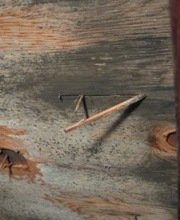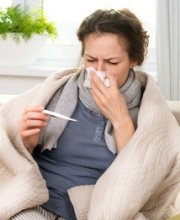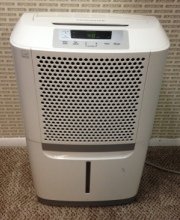Find a Mold Specialist Now
Click or Call, Toll-Free 24/7
Symptoms of Black Mold Exposure
You may wonder if you are experiencing symptoms of black mold exposure or if you’re dealing with ordinary environmental allergies such as hay fever or something else. We can’t diagnose you or offer medical advice, but we can tell you about the typical black mold health risks and what to do if you think black mold is making you sick.
But let’s start at the beginning.

What Is Black Mold?
When people talk about black mold, they are usually referring to stachybotrys chartarum, a strain of mold with a characteristic slimy black appearance. Stachybotrys chartarum is not the only strain of mold that is black in color, though, and you cannot tell for sure what kind of mold is in your home just by looking at it. The only way to know for sure is to have the mold tested. Here you can learn more about mold testing.
Stachybotrys chartarum is sometimes referred to as toxic mold. The mold itself is not really toxic, but it produces harmful chemical substances called mycotoxins. The mycotoxins produced by black mold are what make many people ill.
Follow this link to see more pictures of black mold.
Symptoms of Black Mold Exposure
The symptoms of exposure to black mold vary from person to person. The symptoms can vary in severity, too. Some people get very sick while others have only minor symptoms. Some people don’t seem to be affected at all.
Some people experience greater black mold health risks than others, including babies and small children, elderly people, people with breathing disorders like asthma, and people with weakened immune systems. Those are not the only people that can get sick from exposure to black mold, though. Exposure to mold is not healthy for anyone.
Common symptoms of exposure to black mold include:
- Coughing
- Sneezing
- Wheezing
- Difficulty breathing
- A runny or stuffed up nose
- Red, itchy, irritated and/or watery eyes
- Chronic sore throat
- Headaches or migraines
- Chronic sinus infections
- Bronchitis
- Pneumonia
- Skin rash or hives
- Lethargy or fatigue
What Should You Do If You Have Symptoms of Black Mold Exposure?
- See your doctor. Let your doctor know if you think your symptoms might be related to exposure to black mold. Your doctor may order blood tests to check for antibodies to specific strains of mold. Of course, other diagnostic tests may be needed, depending on your specific symptoms.
- Consider having the mold in your home tested. The Centers for Disease Control and Prevention (CDC) says that since all types of mold are potentially harmful and need to be removed from the home, it is usually not necessary to test mold to find out what kind it is. If you want to know for sure what kind of mold you’re dealing with, though, you can opt to have it tested. Ask your doctor if that information will be useful in terms of treating your mold-related health problems.
- Have your home inspected for mold. Mold remediation specialists often offer free home inspections. By having a professional inspect your home, you make sure you’ve located all areas of mold growth. It’s important to make sure all of the mold has been located and is then removed because you probably won’t recover from your mold-related illness if you continue to suffer exposure to any mold in your home.
- Arrange to have the mold removed from your home. If you’re experiencing symptoms of black mold exposure, you should not attempt to clean up the mold yourself. Doing so would further expose you to harmful mycotoxins and could make your condition worse.
- Ask your doctor if it is safe for you to remain in your home until the mold can be removed. Depending on the severity of your mold-related health problems, you may need to arrange to stay somewhere else to avoid any further exposure to black mold. If anyone in your home is at high risk for mold-related illness, his or her physician should also be consulted for advice.
For Help with Mold Removal
If you need to hire someone to remove black mold from your home, we suggest scheduling a free consultation with a mold removal professional. Even if you are planning to do the work yourself, you can benefit from some free expert advice from an experienced professional, including information on the safe handling of materials that may be contaminated with mold. For a list of qualified mold removal professionals offering free in-home consultations in your area, just follow the link.
Return From Symptoms Of Black Mold Exposure To Our Main Black Mold Health Page
Privacy Policy Terms and Conditions Accessibility Do Not Sell My Information Disclaimer Contact Us




